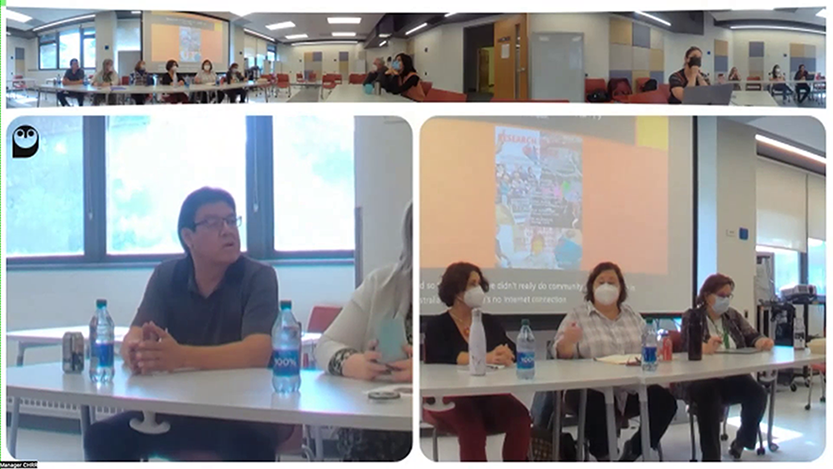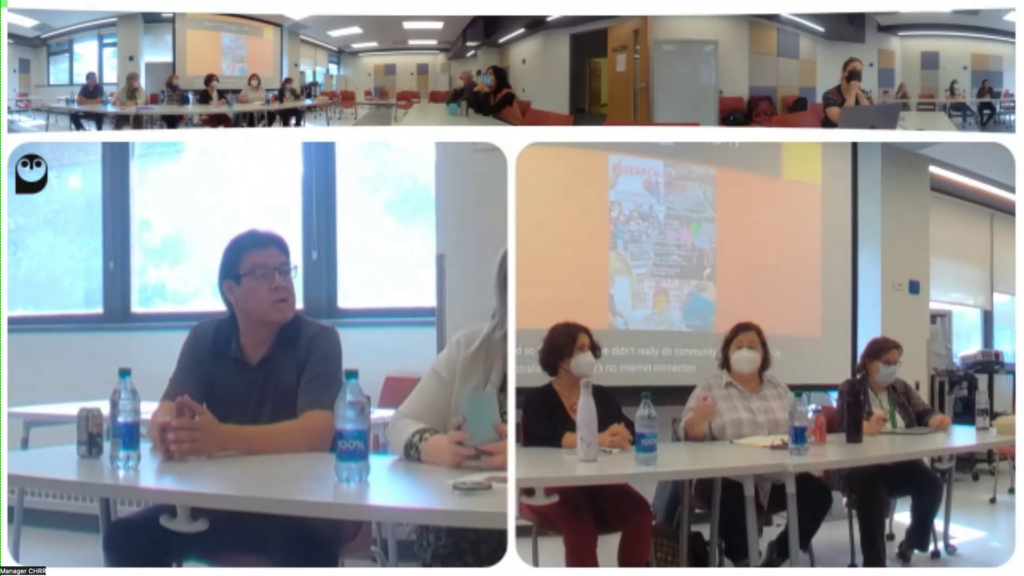Research in the Age of COVID
2022
Dr. Pauline Tennent

On Sept. 21, 2022, researchers from a variety of disciplines discussed their experiences – good, difficult, surprising – in conducting research in the age of COVID. This was an opportunity to reflect, learn, grow & move forward as we figure out how to do research in the middle of a pandemic with far reaching and long lasting human rights implications.
In March 2020, when the World Health Organization declared the novel coronavirus outbreak a global pandemic, almost every aspect of our lives abruptly changed. For researchers across diverse disciplines, this included not only the research we do, but importantly, the way we do research. Lockdowns meant the cancelling of overseas travel plans, as well as plans to work in many rural and remote communities. A commitment to social distancing meant that building research relationships and collecting data, which typically relies on face-to-face interactions, moved to virtual settings bringing with it a host of barriers including access and availability of internet and communication networks, use of communication technologies, as well as technical know-how and skill for researchers and community members alike. Many researchers also shifted to new areas of inquiry in response to not only the pandemic but other human rights crises that were occurring alongside.

Recognizing this time of immense change and its impact on the research landscape, on September 21, 2022, the Centre for Human Rights Research at the University of Manitoba focused its Methods and Mediums workshop series on “Research in the Age of COVID.”
Panelists included:
- Michelle Driedger, Rady Faculty of Health Sciences, University of Manitoba (UM)
- Stewart Hill, Manitoba Keewatinowi Okimakanak Inc.
- Kiera Ladner, Political Science and Mamawipawin, UM
- Shirley Thompson, Natural Resources Institute, UM, and
- Lori Wilkinson, Sociology, UM.
Panelists spoke briefly about their research projects – exploring health communication messaging around the pandemic, water governance in God’s Lake, food insecurity and housing crises in First Nations communities in Manitoba, the impact of the pandemic on Indigenous and newcomer communities throughout Canada, the US and Mexico, as well as the arrival of Afghan newcomers to Canada and their settlement needs and challenges in the midst of a global pandemic. And while these research projects utilized diverse methods (ex., participatory methods, survey data, content analysis, focus groups, in-depth interviews) and methodologies, they all had as a common thread a commitment to research that is critical, emancipatory in nature, ethical, responsive, and rooted in the community.

Our panelists, like other researchers working on issues related to equity and human rights in the context of COVID and neoliberalism, face pressures such as a demand for standardized research, controlled experiments, and a rapid turnaround of data into results. Such approaches are often rooted in colonial structures and frameworks that privilege positivist ways of knowing – they do not, and cannot, capture the complexity of lived experience.
Dr. Janet Smylie, a Métis scholar from the University of Toronto set up an Indigenous clinical research model to respond to unmet COVID-19 response needs for First Nations, Inuit, and Métis peoples living in Tkaronto. Alongside her team, she set up an Indigenous-specific testing centre that subsequently provided vaccination and used a wraparound support model for its clients, where everyone who came was treated in a good way, was supported as needed for their unmet material, health and social service needs, and all received a call back about the test result (even when it was negative). Smylie and her colleagues referred to this approach as “feast testing” as opposed to the “fast food testing” model that was happening at other centres. Echoing the words of Dr. Smylie, panelists shared their concerns over the risk of prioritizing “fast food research” resulting from pressures from government, academia, and from funding agencies. Panelists instead advocated for research that is rooted in an ethics of care, and that can has the time and resources necessary to build trust with communities and develop genuine relationships – virtual or otherwise. They spoke of a need for longitudinal research that can capture that changing complexity of people’s lives in a context of growing inequalities.
“Human rights are our best guide through this crisis and must be embraced in its aftermath.”Alex Neve, Former Secretary General of Amnesty International Canada
COVID-19 is a human rights crisis. It has exposed pre-existing inequalities and inequities in our society and exacerbated those fault lines. Moving forward, research on human rights must account for the ways that the social determinants of health intersect and interact impacting individuals, communities, and society. In the context of not only the pandemic but also in the colonial context that is Canada, there is a particular need for data sovereignty for Indigenous communities to ensure that research works for the needs and desires of the community and contributes to their self-determination.
For more information on ‘Research in the Age of COVID’, please see here as a starting point.


